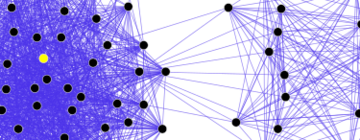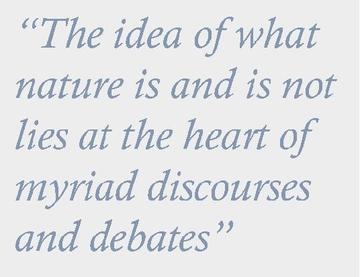3-Day Workshop: Nature and the Social Order since the 1970s
Nature and the Social Order since the 1970s:
Environmental Humanities and HSMT 3-Day Workshop
The climate crisis is as much a political and conceptual crisis as a material one. Especially since the 1970s, a host of movements, schools of thought, and other trends have emerged which place ideas of nature and environment at their core. Some propose that extinction is imminent and that society must be fundamentally re-ordered to survive. Others propose an incrementalist approach which seeks to leverage the tools of capitalism to protect the climate and environment. Still others look for answers in the fabric of Western thought itself, insisting that the roots of the climate crisis lie in binary distinctions between nature and culture, between the human and the nonhuman world. Indeed, effective governance of the natural world has been integral to legitimising political regimes globally and instrumental in the creation of new global governance structures, such as the Intergovernmental Panel on Climate Change (IPCC). The idea of what nature is and is not lies at the heart of myriad discourses and debates, in politics, academia, and in wider culture.
Although such themes are subject to major interrogation in their respective fields, attempts at historicising nature across contexts are scarce. In partnership with Sciences Po, we are therefore organising a three-day workshop on Nature and the Social Order since the 1970s. We will invite world-leading scholars across disciplines working in this area, and through multi-institutional and multi-disciplinary collaboration, will bolster this nascent field of scholarship, helping to push the environmental humanities to the forefront of the international research agenda.


Nature and the Social Order since the 1970s: Environmental Humanities and HSMT 3-day Workshop
Programme (download pdf)
Monday 22 May
Location: Ertegun House, 37a St Giles, Oxford OX1 3LD [Please note change of venue]
|
15:00-15:15 |
Opening Remarks |
|
|
|
|
15:15-16:30 |
Keynote Lecture
Pierre Charbonnier (Sciences Po Paris) Climate geopolitics |
|
|
|
|
16:30-18:30 |
Panel 1: Nature and Neoliberalism Chair: Isabel Oakes
David Priestland (University of Oxford) Marxism-Leninism, neoliberalism and nature
Matěj Spurný (Czech Institute of Contemporary History/Charles University Prague)
Troy Vetesse (EUI) Animal spirits: nature, neoliberalism, and markets |
Tuesday 23 May
Location: Maison Française d’Oxford, 2-10 Norham Road, Oxford OX2 6SE
|
09:30-10:00 |
Coffee |
|
|
|
|
10:00-12:00 |
Panel 2: Nature and Technology Chair: Daniel McAteer
Niklas Olsen (University of Copenhagen) The economist as techno-fixer: Thomas Schelling and the challenge of global warming
Hadeel Badarni (University of Chicago) Ecologies of settler-colonial know-how: the making of Israel’s “high-tech” agriculture
Apolline Taillandier (University of Cambridge) Engineering spontaneous orders: transhumanists and the remaking of markets and human nature
Julia Menzel (MIT) Metaphysical collapse? Black holes, IBM, and the orders of nature |
|
|
|
|
12:00-13:00 |
Lunch |
|
|
|
|
13:00-15:00 |
Panel 3: Neo-Malthusianism Chair: Patricia Clavin
Marius Bickhardt (Sciences Po Paris/Centre Marc Bloch Berlin) Environmental Malthusianism and its critics: the legacy of Marx and Malthus
Aidan Tynan (Cardiff University) Neo-Malthusianism and population aesthetics since The Population Bomb
Rob Iliffe (University of Oxford) Neo-Malthusianism in 1980s popular culture Weronika Parfianowicz (University of Warsaw) “We must learn to satisfy our consumption appetites, according to necessary needs, not the artificially stimulated whims”. Reflection on ecological impacts of consumption in socialist Poland |
|
|
|
|
15:00-15:30 |
Coffee |
|
|
|
|
15:30-17:30 |
Panel 4: Nature, Nation and the New Right
Netta Cohen (University of Oxford) Remaining behind: environmentalism in Israel-Palestine, 1963-1990 Marie Moller (Danish Institute for International Studies) Earth people: elementary politics of Rassemblement National ecology
Pollyanna Rhee (University of Illinois, Urbana-Champaign) Making nature’s new conservatism |
Wednesday 24 May
Location: Maison Française d’Oxford, 2-10 Norham Road, Oxford OX2 6SE
|
09:30-10:00 |
Coffee |
|
|
|
|
10:00-12:00 |
Panel 5: Concepts and Images of Nature Chair: Martin Babička
Julia Nordblad (Uppsala University) A history of biodiversity as a political concept: the 1986 Forum on Biodiversity and the challenge to liberal environmentalism
Victoria Myznikova (Rachel Carson Center for Environment and Society Munich) V Vernadsky’s “noosphere” and Russian environmental policies: shift to sovereignty
Ben Mechen (University of Bristol) “No Trespass”: policing and photographing the landscape in 1980s Britain
Lauren Spohn (University of Oxford) Earth rising: spaceflight and the global ecological imagination, 1968-2000 |
|
|
|
|
12:00 |
Closing Remarks |
Advisory Board
Organising Committee
Deadline for submissions: Monday 28 November 2022
From notions of the social order to the sciences, and from international treaties to the politics of family, gender, and sexuality, modern debates have long hinged – implicitly or explicitly – on questions of what nature is, what is to be done with it, and what human activities fall under its domain. The period since the 1970s has seen a broad and unique flourishing of different nature concepts in academia as well as the political and cultural spheres. Disputes about the governance of the natural world have been central to the legitimacy of different political regimes and their economic doctrines across the globe. One prominent context for such ideas has of course been the looming spectre of environmental catastrophe, fuelling the rise of new social movements, as well as novel global governance structures and expert institutions like the Intergovernmental Panel on Climate Change. In addition, various intellectual shifts – such as feminism, poststructuralism and decolonization – have criticized the nature/culture and spirit/matter binaries and their political and economic logic as Western epistemic constructs. But conversely, we can see the persistence and development of biological understandings of society, including sociobiology, neo-eugenics, and transhumanism.
Although such themes are subject to major debate in their respective fields, attempts at historicising nature across contexts are scarce. We are therefore organising a workshop on Nature and the Social Order since the 1970s, seeking contributions from scholars working in the fields of intellectual and cultural history, history of science and the environment, as well as related disciplines such as political theory and anthropology. We welcome papers that attempt to historicise the idea of nature and related concepts in the period since the 1970s, particularly those that examine broader links across disciplines and ideologies. We are also especially grateful for submissions with a global or a non-Western perspective. Topics may include but are not limited to:
- Nature and ideologies (such as neoliberalism and socialism)
- Environmentalism, ecology and the political function of science
- Constructivism and human nature
- Nature, gender, and sexuality
- Technology and nature
- Biology and other sciences’ role in defining human nature(s)
- Concepts of nature and race
To apply, please send an abstract of up to 300 words and a CV to nso@history.ox.ac.uk by Monday 28 November 2022. We hope to be able to support travel and/or accommodation for a limited number of presenters without access to institutional funding.


